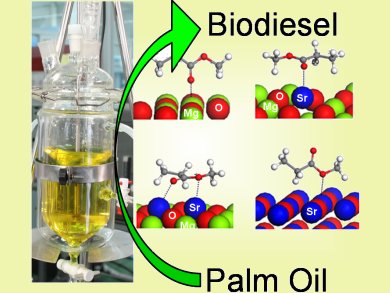Strontium–magnesium mixed oxide catalysts for the transesterification of palm oil to methanol provide a facile and green alternative to existing homogenous and biocatalysts for the production of biodiesel. Temperature-programmed desorption results evidence a strongly basic site that induces synergy between the active Sr species and the MgO support; an effect that has proved important in other heterogeneous acid-base catalyses.
Kajornsak Faungnawakij and co-workers, National Nanotechnology Center, Pathumthani, Thailand, obtained biodiesel with a 96 % methyl ester content under mild reaction conditions (60 °C, 0.1 MPa, 75 min) over their Sr–MgO nanocomposite catalyst. The evidence for synergistic effects between active Sr and Mg species was clearly demonstrated by tests over a series of catalysts with varied Sr-to-Mg molar ratios. An optimum Sr content of 20 mol % was also found by varying the ratio.
The catalyst was prepared by incipient wetness impregnation, followed by calcination at 600 °C to induce a partial solid state reaction that formed the super strong basic site. The porous Sr–MgO nanocomposite gave the palm oil glycerides and methanol reagents improved access to the catalyst surface compared to bulk SrO, as confirmed by N2 adsorption–desorption, SEM (Scanning Electron Microscopy) and TEM (Transmission Electron Microscopy) analyses.
- Sr–Mg Mixed Oxides as Biodiesel Production Catalysts,
K. Faungnawakij, B. Yoosuk, S. Namuangruk, P. Krasae, N. Viriya-empikul, B. Puttasawat,
ChemCatChem 2012, 4, 209–216.
DOI: 10.1002/cctc.201100346




